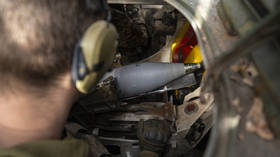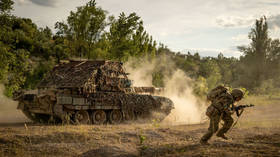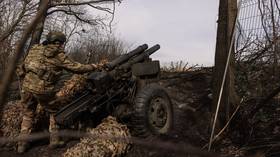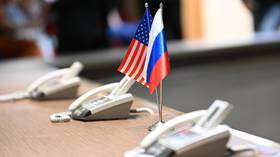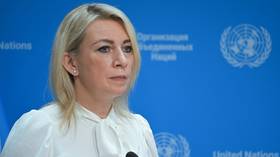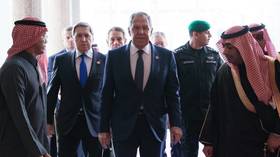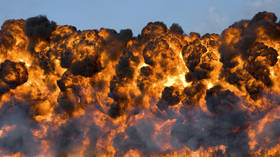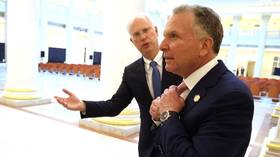‘Foreign intervention to Syria not a Hollywood movie ending with happy kiss’
While Western countries push for military intervention in Syria, a former French spy explained to RT that Syria and its neighbors are a melting pot of religious and social groups and stirring it could spill over into a bloody conflict.
Claude Moniquet, a former member of the French intelligence service and the founder of the European Intelligence and Security Center, a Brussels-based think tank specializing on terrorism and security issues, gave his view on why the Libyan scenario does not fit for Damascus. RT: You’ve spend a lot of time in North Africa and the Middle East, so looking at the Arab Spring, did you see this coming, were you expecting this? And how much of it, do you think, is a product of people going against repressive governments and how much of it as some governments claim has been fueled from the outside?Claude Moniquet: We probably said things which were probably not really politically correct but very popular. First of all, we did not see it arriving. We knew that there were a lot of problems in the Middle East, the Arab world North and the Africa – a lot of poverty, social problems, cultural problems, problems of the youth, youth without employment, and so on and so forth. And we knew that something was burning, but we were much more focused on the risk of Islamization than the risk of a so-called Arab Spring. When it happened, when we saw the mechanics, we understood that it will be a large and deep shock not only for the Arab world, but for the whole world. In the beginning it was the exasperation of people wanting to live a normal life. It is very clear in Egypt, for instance. If you take the Tahrir Square, at the beginning, you had very young people, graduates most of them, most of them helped and supported by the United States, some of them were trained by the United States and funded by the United States, some with a very clear and very liberal idea of the future. The only sad thing is that it did not happen in the Western world, but in an Arab country, where the political agenda was different. We had these people coming from the street, but with a clear view of the future and everything was occupied at the end of the day by the dissatisfied Muslim brothers.RT: So do you see this as a trend in region, where you have openly religious leaders coming into power?CM: I personally wrote, a long time before the Egyptian elections that the only possibility is to have the Muslim brotherhood as first political formation in Egypt. I mean everything else was just impossible; because you have a very poor society with a large percentage of people who are just not able to read the newspaper, with a large unemployment number. So everything was in place for the extremists and certainly not for democraticians [sic] in Egypt, and the same in Tunisia and the same in Morocco and Syria.RT: Yes, and looking at Syrian crisis – it is complicated and it is far from over. We heard the US and Turkey studying a no-fly zone, and we’ve also heard from the French defense minister, who said that France is willing to help in looking at this effort. Is that were you think this is headed, a similar Libyan scenario of imposing a no-fly zone?CM: Actually very clearly, no leader of the Western world wants to go to Syria, but maybe at one point it will be impossible to avoid. I don’t think so, but it’s possible. If you go into Syria, I think it will be a nightmare, but we’ll see. For the moment, we do not see any clear evolution in Syria. It clearly seems that the government cannot win, but it cannot lose. So for the moment you have just killing after killing and bombs after bombs with no possibility of reconciliation because at the base of the problem you don’t have the problem of democracy, of course you have a problem of democracy in Syria, but it is not the main point.The main point is the problem between the Sunni and the Alawis, which are 10 per cent of the population. The Alawis are leading the country for 20-30 years and the Sunni, which are 75 per cent, say ‘No. It is enough we do not want you anymore.’ But it is not Luxemburg, it is not Switzerland. In the Middle East, in Syria today for the Alawi losing the grip on the power means dying and I’m not sure if the country’s 2 million Alawi are eager willing to die. So they have no other choice but keeping the power with the support by the way of the Christians. You have 2 million Alawi and 2 million Christians, and Christians in Syria are clearly supporting the power, because they fear to have problems when Sunni will reign in the country, as their fellow Christians in Egypt had with the Muslim Brothers, as have the Christians in Iraq. Today it seems clear that you cannot be a Christian in the Muslim world. Yes you can be a single Christian and nobody will hurt you, but you cannot have a Christian organized community with a possibility of a political activity in the Muslim world today, I mean the Muslim-Arab world today.RT:Well despite some of the tough words the Western leaders and their allies said today in regards to Syria, you still feel that they will not go into Syria on a full military scale. What do you think is still holding them back?CM: We think and the leaders think that Syria could be worse than Libya and I think that basically they’re right. Because in Libya we had 6 million people and in Syria we have between 17 and 20 million people, we have clearly extremists in Syria. It is on the border of Iran. It is between Iran and Israel. You have the Lebanon problem, which is not so far – so no one wants to get involved there. The last time we – I mean the Western armies – were involved in the area it was in the 1980s, in Lebanon. I was there and we left with the body bags of fellow soldiers – 242 of the American marines and 62 French paratroopers. I was there that day and all my life I will remember these body bags. And it was not such a nice experience for us and I do not know if we want to have such experience again. And if we go there we risk of having this experience again. It is not a game, it is not a Hollywood movie where the good guy, a good cowboy, can just come into the city and make everything calm and quiet again, just killing two or three bad guys and at the end of the movie to kiss a beautiful woman. The marines, they have a lot of killing, it is really not the same story. It is the Middle East. It is a savage war and after this war whoever will be the winner – you will have terrible sentiments of killing, revenge killing and so forth and we do not want to be involved there.RT:Well from the intelligence circles, can you confirm the smuggling of weapons into Syria as well as the presence of the some of the foreign secret service in the country?CM: Very probably. We have some coming from Iran for the government and some from Qatar and Saudi Arabia for the rebels – it’s clear, I think. Everyone knows it. And some intelligence services, for instance probably he British MI6, maybe the French, maybe the Americans, are involved on one level or another level in support of the opposition.RT:On one hand you’re saying that the West and its allies don’t really want to get involved in the operation in Syria, at the same time you’re saying that it is very likely that there are secret service agents in the country already. But it is getting involved then. What is the difference between military operation and having your agents on the ground?CM: You can deny. You can deny. When you send the intelligence people, even if they’re killed, you can say that ‘I do not know him, maybe he is a journalist. I do not know. I’m not involved.’ The main prospect of the use of secret service and the secret agents is the possibility of denial – ‘Oh, I do not know him.’ When you are caught using guns, tanks, planes, you can’t say ‘Oops, it is not my plane.’RT: Let’s talk about Al-Qaeda operating in Syria. Is this true and if so what can the situation develop into?CM: It is probably very true. What we know is that Syria at the time of the war in Iraq, Syria was one of the platforms of action for Al-Qaeda. Lots of people coming from Europe from France from Belgium from Germany went into Iraq through Syria. So it’s clear that Al-Qaeda had at that time its own networks there. It’s also clear that a lot of people, we do not how much, but a lot of people who were involved in the Iraqi war are now fighting with the opposition against the Syrian regime in Syria for a very obvious reason.As you remember members of Al-Qaeda in Iraq were killing Shiites as well as British and American soldiers. And in Syria Shiites are in power, Alawi are a branch of Shiites. So for the people of Al-Qaeda who practice strict obedience, they’re the worst enemy. And to kill a Shiite is better than to kill a Christian for them, so it is a good motivation for them. I do not think we have Al-Qaeda fighting on the streets of Aleppo, because it does not make sense, but when we had a bomb in the center of Damascus a few weeks ago, it is very likely an Al-Qaeda job. Actually for the moment nobody actually really knows what the different tendencies in the opposition in Syria, because when you see the people from National Syrian Committee in Paris, they’re very modern, very Western-speaking, very democratic and so on. When you see people plotting a bomb in Damascus, it’s another thing, so where is the real truth, where is the real power of the moderates and the democrats, if they exist? What is the real power of the Al-Qaeda, what is the real power of the Saudis? Nobody really knows. And we will see it and we will know it after, but when will be this after? It could be in tomorrow and could be in six months. It could be in two years.



